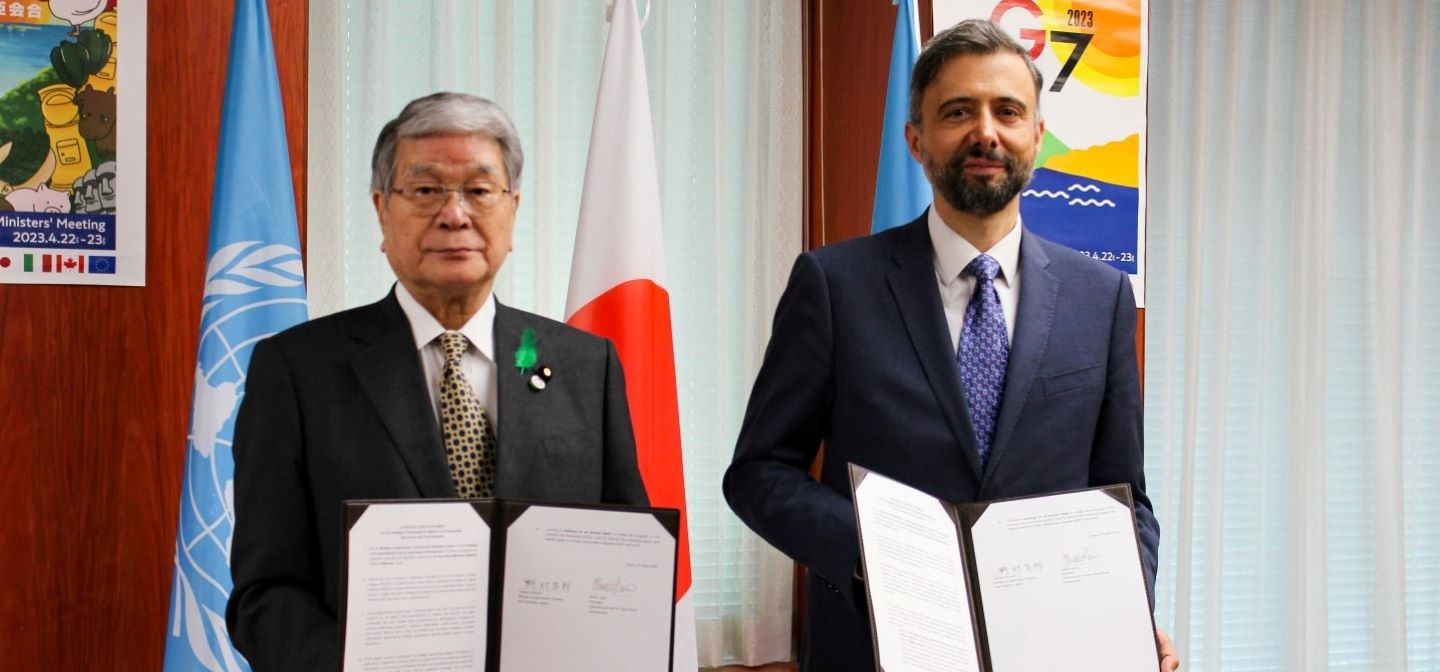Japan and UN’s IFAD boost global food security by connecting small-scale producers to the private sector
IFAD Asset Request Portlet
Asset Publisher
Japan and UN’s IFAD boost global food security by connecting small-scale producers to the private sector
20 April 2023
Rome/Tokyo, 20 April 2023 – Connecting small-scale food producers with larger agrifood companies can go a long way to ensuring global food security. In a statement released today by Alvaro Lario, President of the UN’s International Fund for Agricultural Development (IFAD) and Tetsuro Nomura, Minister of Agriculture, Forestry and Fisheries of Japan (MAFF), the two leaders announced the launch of the Enhanced Linkages between Private Sector and Small-scale Producers initiative (ELPS) which will be presented at the G7 Agricultural Meeting in Miyazaki later this week.
The agreement between IFAD and MAFF of Japan promises to strengthen their strategic partnership with the aim to make small-scale producers and local food systems around the world more resilient and sustainable together with the enhanced engagement of private sector companies. ELPS investments will be geared towards improving agricultural productivity, raising incomes, and enhancing the livelihoods of small-scale producers in developing countries. The MAFF will support IFAD with approximately US$2 million for the implementation of the initiative as part of this partnership.
Living on the front lines of climate change, small-scale food producers, including farmers, fisher folks, herders and food processors, are being hit the hardest by the current combination of crises, especially the climate and cost-of-living crises. Unpredictable weather events, drought and floods hamper production. Many cannot absorb prices hikes because they already spend more than half of their income to put food on the table. Yet small-scale farmers are the cornerstone of global food security, producing one third of the world’s food.
The joint statement recognizes the essential role that the private sector has in eradicating world hunger, malnutrition and poverty. By working with small-scale food producers, private sector partners such as food companies can contribute to sustainable agriculture and resilient food systems. Mutually beneficial cooperation will help increase agricultural production, boosting profits for both partners as well as strengthening global food security.
Minister Nomura said, “This initiative will facilitate initial stages of collaboration between the private sector and small-scale farmers in developing countries. It will work with local farmers and their organizations that are deemed to merit from the private sector’s expertise in enhancing their productivity and sustainability, and in turn provide the private sector with opportunities to engage in local farming communities to enhance the sustainability of their value chains.”
“IFAD is honoured to implement this flagship initiative to boost public-private-producer rural investments, with the leadership of Japan under the G7 Presidency. With IFAD’s unique capacity, we can further strengthen the capacity of small-scale food producers in developing countries to access new markets” said the President of IFAD. “Small-scale producers can greatly benefit from the expertise, knowledge, and technologies from private sector to increase production and incomes, while contributing to global food security.”
G7 Agriculture Ministers’ Meeting and IFAD in Japan
On 22 and 23 April President Lario will participate in the G7 Agriculture Ministers' Meeting in Miyazaki to share IFAD’s vision with G7 leaders, and make the case for investing in rural development and resilience as the most cost-effective way to improve global food security, and support global stability.
The President of IFAD will also meet with several CEOs of large Japanese food companies in the coming days in Miyazaki to seek out opportunities to connect the Japanese private sector with small-scale food producers in developing countries.
Japan and IFAD share a commitment to achieve global food security and improved nutrition with a focus on low-income and lower-middle-income countries, particularly in Africa and Asia. Japan is a key partner for and member state of IFAD. With a total contribution of US$619.4 million to IFAD’s regular replenishments since 1977, Japan is the Fund’s sixth largest contributor.
Note to editors:
President Lario will be available for interviews and to provide quick reactions in Miyazaki.
Press release No.: IFAD/33/2023
IFAD is an international financial institution and a United Nations specialized agency. Based in Rome – the United Nations food and agriculture hub – IFAD invests in rural people, empowering them to reduce poverty, increase food security, improve nutrition and strengthen resilience. Since 1978, we have provided more than US$24 billion in grants and low-interest loans to fund projects in developing countries.
A wide range of photographs of IFAD’s work in rural communities are available for download from its Image Bank.
